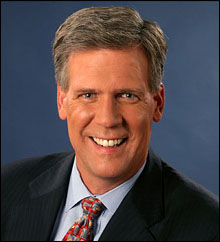
TOO CLOSE FOR COMFORT?: Bush now has Tony Snow to help him make nice with his watchdogs
|
A president with a history of antipathy toward the media complains openly about the “knee-jerk liberal press.” His White House eavesdrops on journalists, fumes about unwanted leaks, and takes spin control to new heights. When the chief executive finally runs into serious political trouble, a long-frustrated press corps practically revels in triumph.That might sum up the near toxic relationship between George W. Bush and a good chunk of the mainstream media these days. But it actually describes the combat between Bill Clinton and the Fourth Estate, as laid out in Howard Kurtz’s 1998 book, Spin Cycle: Inside the Clinton Propaganda Machine.
That surprise punch line holds a lesson. Regardless of how loud the grumbling grows about the hostile atmosphere between the Bush administration and the media — an argument fueled by Attorney General Alberto Gonzales’s recent pronouncement that the government can prosecute journalists for publishing classified material — an adversarial relationship between journalists and whoever occupies the White House is, in many ways, the natural order of things.
Any administration — with an enormous bully pulpit and the resources of the federal government at its disposal — is constantly engaged in an effort to convince the American public that its policies are working, its promises being kept. The news media — backed by major financial resources and wrapped in the protection of the First Amendment — should be constantly engaged in an effort to scrutinize and vet those very policies and promises.
When a president succeeds in maintaining public support, either by dint of the wisdom of his policies or by outmaneuvering a complacent, sloppy, or petty press, that’s the way the system works. Conversely, when journalists succeed in raising legitimate doubts about the nation’s leadership and manage to earn the trust of the citizenry, that’s healthy too.
Some of those interviewed in a May 16 Editor & Publisher story about reports that the feds have been tracking media phone calls moaned and groaned about the practice. But the best response was delivered by the Washington Post’s Walter Pincus. “You can’t sit and worry about it,” he said. “It goes all the way back to Watergate. It’s a fact of life, you go on and do what you do.”
In other words, stop whining and do your job. And may the better man — or woman — win.
Natural foes
In a piece for the American Journalism Review, editor Rem Reider declared that it was time to shut down the celebrity-studded White House Correspondents’ Association gala, noting that “It’s a vivid symbol ... of what’s so very wrong with elite Washington journalism.” There is something wrong with an event that, as Reider says, “underscores the notion that journalists are part of a wealthy elite.” But the bigger problem is that it underscores the perception that the press is part of a power elite more interested in retaining its perks and status than in subjecting other members of this exclusive club to serious and squirm-inducing scrutiny.
Sometimes the boundaries between government and the media are completely blurred, as was recently the case when a local paper in Newark, New Jersey, took $100,000 of municipal money to publicize positive developments in the city. That’s an obvious call, but other decisions regarding those boundaries are considerably trickier.
In some journalistic quarters, there was criticism of the 1995 New York Times and Washington Post decision to print the Unabomber manifesto at the request of the Justice Department — not only because it represented caving in to a terrorist’s request, but also because, in effect, it changed the media from a government watchdog into an arm of government and law enforcement.
During wartime, news outlets often err on the side of caution, motivated by an understandable unwillingness to put American troops in harm’s way. (The Washington Post reported that the 17 media outlets that had advance knowledge of the initial 2001 attack on Afghanistan all agreed to withhold that information.) But even in perilous times, the media need to guard their independence zealously.
A number of observers, this one included, felt that a group of five television news executives made a mistake by unanimously and quickly agreeing — via a conference call — to then–national security adviser Condoleezza Rice’s request in October 2001 to screen any Al Qaeda messages before airing them. Rather than giving a blanket okay to a government plea for prior restraint, the executives should have echoed the responses of Washington Post executive editor Leonard Downie Jr. and Boston Globe editor Marty Baron, who both said they reserved the right to exercise their own judgment on a case-by-case basis.
The Pentagon’s decision to embed roughly 600 reporters with US troops during the 2003 invasion of Iraq was an attractive offer to a news industry shunted to the sidelines during the 1983 invasion of Grenada and during the 1991 Persian Gulf War. The quality of the embedded reporting was mixed. But it’s still hard to shake the overarching concern that by depending on the US military for safety, sustenance, and information, journalists had forfeited some of their crucial objectivity.